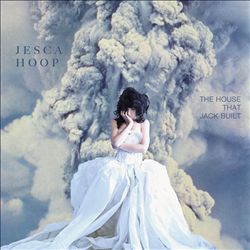Artist: Jesca Hoop
Album: the House That Jack Built
Jesca Hoop makes albums rooted in skewed folk-pop. Her melodies, however hummable many of them are, refuse to resolve neatly, and her arrangements often unfurl with a private logic. The House That Jack Built features, for example, Ode to Banksy, girl-group pop by way of  rapid Madchester drum shuffle, where the chorus hook is a key change that’s exactly one bar long. Or, much darker, there’s Deeper Devastation‘s soft guitar, distant theremin-like wailing, slow cavernous drums, and African-style call-and-response vocals that feel as holy as they are imperfectly tuned. When I’m Asleep is perky and almost power-pop, but if that’s not a quick-fingered yet droney sitar and hand drums in the background, along with metallic clanking, it’s a good imitation. Moon Rock Needle is even perkier, constantly threatening to outrace itself. But it features a mechanical cackling dog and mad-scientist percussion worthy of Tom Waits. Even the essentially straightforward single Born To puts the vocals through various odd production and mixing tricks, and suspends its chorus on a fourth in what isn’t even the song’s home key.
rapid Madchester drum shuffle, where the chorus hook is a key change that’s exactly one bar long. Or, much darker, there’s Deeper Devastation‘s soft guitar, distant theremin-like wailing, slow cavernous drums, and African-style call-and-response vocals that feel as holy as they are imperfectly tuned. When I’m Asleep is perky and almost power-pop, but if that’s not a quick-fingered yet droney sitar and hand drums in the background, along with metallic clanking, it’s a good imitation. Moon Rock Needle is even perkier, constantly threatening to outrace itself. But it features a mechanical cackling dog and mad-scientist percussion worthy of Tom Waits. Even the essentially straightforward single Born To puts the vocals through various odd production and mixing tricks, and suspends its chorus on a fourth in what isn’t even the song’s home key.
That’s without mentioning the extraordinary Peacemaker, which turns Aristophanes’s great play “Lysistrata” — in which the title character ends the Peloponnesian War by persuading the women of Greece to withhold sex until peace is achieved — into one of the most intensely, sinuously sexy songs I’ve ever heard; a song that persuasively clarifies the stakes. Jesca Hoop has an interesting mind, one especially tuned to relationships. Hospital (Win Your Love) is about exactly that: starting with the parental attention from a childhood broken bone (“Sister Jen, she doesn’t exist til when I need something/ she’ll bring me ice creams”) and carrying the lessons forward (“Oh my old friends, I’m voting you in or out/ You envy me, I walk through red carpet to my cast signing … Now come on, you cunt, come and hit me/ there’s no kind of attention that a black eye wouldn’t get me”).
Ode to Banksy insists “My pencil is dull… there’s no wheels a-turning in my skull”, putting all her dependence on “My mystery man, so provocative, so underground… You come invisible to paint the town”. But her head’s active enough that she runs him an agenda from graffiti on billboards, to nuclear terrorism (referencing the bombs dropped on Hiroshima and Nagasaki: “Ring around the Fat Man, arms around Little Boy/ Daddy gave me this fantastic toy/ Let’s go and find out what it can do/ Oh oh oh/ Ashes ashes we all fall down/ There’s nothing standing for miles around”). The song’s final vandalism is “Tiananmen Square, Mickey D’s in the air”; it’s probably a comedown in scope, but she doesn’t say.
D.N.R., sad and straightforwardly folky, is simpler, a loving tribute to her widowed father after “No antidepressant of any sort/ could change the weather report/ When the wind chill factor was high, he took the whole bottle down/ He’s got his paperwork now: D.N.R.” (Do Not Resuscitate). But even as she sings of who will take care of the dog, she doesn’t overlook the larger implications of suicide: “Jesus wants me for a sunbeam, he raised me up right/ but being raised in the light of Christ adds insult to injury that night”.
I won’t deny the validity of Hoop’s darkest thoughts: her songs can be disturbing, as can the world they discuss. But I will say her records aren’t depressing. They’re too interesting for that, too playful. “You cannot trust a human being to do the right thing”, she sings: true. But you can trust one to be distracted by the nearest shiny thing. And you can trust *this* one to fit said shiny thing into her thoughts, and her record, somewhere.
– Brian Block
To see the rest of our favorites, visit our Favorite Albums of 2012 page!
